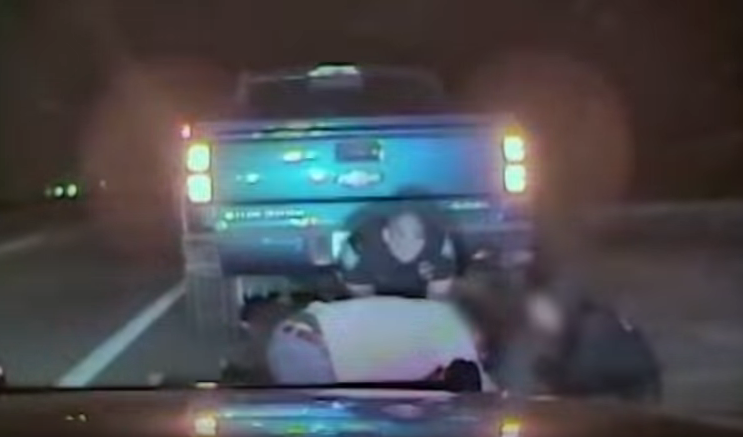Tina Costello sits on the brown leather sofa in her family room, 15-year-old daughter Britney beside her and husband Jeff Litty standing behind them. All eyes are focused on an iPad atop a coffee table.
Jeff reaches over and taps play. The grainy video starts again, sending more tears down moist cheeks.
The screen shows Tina on her back on the side of a highway. Her heart isn’t beating.
Jeff is on all fours over her.
Britney is watching, wailing by her mom’s head.
Police officer Jordan Jones is on his knees trying to pump life back into Tina. Each time his arms recoil, the red tail lights on Jeff’s pickup truck wink.
Nobody noticed that the first time they saw the video. Each of them finds something different during this replay. And the countless replays they’ve seen since.
This amazing footage – the ultimate reality TV – was captured in the wee hours of Oct. 31, 2016, by the dashboard camera in Jones’ squad car. The fact Tina is a frequent viewer of the video gives away that it has a happy ending.
It also serves as a powerful testament to the importance of CPR.
By congressional resolution, the first week of June is National CPR and AED Awareness Week, making this a great time to ask a few important questions:
- Do you know how to perform CPR?
- How about the acronym AED, or automated external defibrillator – do you know what the machine does? When to use it? How to use it? And, perhaps most crucial, where to find one?
- Now the toughest question, the one that’s the focus of this year’s awareness week: Would you trust yourself enough to put that knowledge into action?
To appreciate how important all the answers are, consider the impact that scene had on Tina, Jeff and Britney – and how different things might be had even one of those questions not been answered correctly.
***
In the months since her life hung in the balance beside U.S. Highway 62, Tina’s body sent a faint signal that something was wrong.
Her chest tightened occasionally. It felt as if a piece of hard candy was stuck in her throat. Doctors dismissed it as anxiety.
Then she was in a car wreck. Her airbag didn’t inflate, letting her body bash into the steering wheel. Now she had two reasons for chest pain. Soon, the tightening spells came more often.
Watching TV one night, Jeff saw a commercial about warning signs of a heart attack.
He’d never believed Tina’s anxiety diagnosis. Fearing that her symptoms might trace to her heart, he paid close attention.
***
Tina and Jeff stayed up late on a Sunday night doing paperwork for his company, a construction business in the natural gas industry. Tina began having some of her tightening spells and felt tired, so they called it a night.
About 15 minutes after falling asleep, Tina – normally a peaceful sleeper – was rolling around, kicking her legs and swinging her arms.
“Sweetheart, what’s wrong?” Jeff said.
“My chest is tight,” Tina said.
Jeff immediately remembered the commercial saying that left arm pain was a sign of a heart attack. He asked if it hurt; she said yes.
“Get up,” he said. “We’re going to the hospital.”
***
Tina and Jeff live so far out in the country that they drive three miles on gravel before reaching a paved highway. He knew he could cover the distance faster than an ambulance could find them.
Tina got dressed, grabbed a pillow and a blanket, and laid across the back seat of their truck. Britney sat in front, next to Jeff.
“How you doing, sweetheart?” Jeff said.
“I don’t feel right,” Tina said.
“Stay with me, keep talking,” he said.
The hospital in Norman, Oklahoma, was 45 minutes away. About 15 minutes into the drive, they approached the town of Blanchard, which had an urgent care clinic. Tina suggested going there.
Seconds later, Jeff heard a bang in the back seat. Tina was face-down on the floorboards.
***
Jeff pulled the truck to the side of the road, threw open the back door and rolled his wife onto her back. Her face was blue, her pupils tiny, her tongue swollen.
She wasn’t breathing.
Like the warning signs flashing to his mind at the right time, so did this thought: He was about a mile from the spot where a police officer is always parked when he drives to work. That’s usually around 5 a.m. It was only midnight. If the spot was vacant, Britney would call 911.
Jeff floored it and turned on his hazard lights, figuring one or the other would draw attention.
***
The officer saw the lights and the speeding truck and took off after it.
Jeff pulled to the side of the road. He ran to the squad car and said, “I think my wife is having a heart attack.”
With paramedics on the way, the officer and Jeff placed Tina on the side of the highway and started CPR.
The pair had just finished the third round of compressions and rescue breaths when the ambulance arrived.
***
An AED jolted Tina’s heart back into rhythm. It was needed again in the ambulance. And again in the emergency room.
She suffered both cardiac arrest (an outage of the heart’s electricity) and a heart attack, which is caused by a blockage that limits the flow of oxygen-rich blood. The blockage was to the left main coronary artery that runs down the front of the heart; it’s the type of heart attack known as the “widow maker” because of the low odds of survival.
Odds are also poor for cardiac arrests.
Each year, more than 350,000 people go into cardiac arrest outside of a hospital – and about 90 percent die. CPR can double or triple the chances of survival, especially if performed immediately.
This is why Tina’s story is so extraordinary. And why CPR and AED awareness is so vital.
CPR doesn’t have to include rescue breaths. Hands-Only CPR has just two steps: call 911, then push hard and fast in the center of the chest until help arrives. It’s best to push at 100 beats per minute, which is also the beat of the disco song “Stayin’ Alive.”
Once Tina’s life was saved on the road, she got the care she needed. Doctors implanted a stent to prop open the coronary artery that was 90 percent blocked. She spent the next day in an induced coma, her body temperature reduced to help her brain recover.
She was home a week later.
She’s given up smoking and continues to refine her diet and exercise routines in search of the best fit. She fatigues easily and has occasional memory lapses. Her doctors say all is well, though, easing her worries.

***
The afternoon following Tina’s episode, Jeff’s cell phone rang. A local TV news reporter had seen the video and wanted to interview him and Britney.
“What video?” Jeff said.
That’s when he learned the dashboard camera captured it all. The Blanchard Police Department had posted it on Facebook.
The first time Tina, Jeff and Britney watched it together was on the iPad in their family room.
Jeff studied it like a football coach breaking down a game film, analyzing his performance. His most vivid memory was putting a hand under the back of her head, keeping it above the pavement.
For Tina, it was almost an out-of-body experience. Still is. Most of what she knows about that night comes from everyone else’s version of events – and, of course, the video.
She still watches it every few weeks, if not days.
“It’s sad, but it’s also like a pick-me-up,” she said. “It’s a reminder that, hey, every second of your day is important because life can end at any second.”

***
Consider Britney’s perspective on how things played out.
To fully understand her perspective, know this: Since she was about 10, she’s planned on becoming a cardiologist.
She was committed enough to have studied the subject outside school. In a way, her mom’s emergency was her first case.
Once Tina was loaded into the ambulance, Britney climbed in, too. She asked paramedics detailed questions. She had more for doctors and nurses.
“She took charge,” Jeff said.
Months later, Tina’s cardiologist wrote a recommendation letter that helped Britney earn admission in the National Honor Society. She’s headed into her senior year of high school, even more committed to her career path.
***
Then there’s Jeff career path and how that night changed its trajectory.
Raised by a mother whose philosophy was “be thankful for what you have,” he failed to embrace that. He spent most of his life striving for more.
He spent long stretches on the road trying to grow his business. Realizing how much family time he was missing, he vowed to be home every night. Doing so still ate into his day, requiring a two-hour drive each way; thus the 5 a.m. drive-bys of that police lookout spot.
Then he saw his wife nearly die.
“My priorities all changed,” he said.
Now 60, he’s selling his business.
***
A few weeks after their initial roadside encounter, the officer and his wife visited Waco, Texas. They found their way to the Magnolia Market owned by Chip and Joanna Gaines, stars of the TV show “Fixer Upper.”
The store makes custom metal signs. They ordered one as a Christmas present for Tina and Jeff.
Tina had the perfect spot for it: right outside their front door, in a showplace where she used to keep fresh-cut flowers. Visitors to their home are now greeted with this message: “There will be miracles.”
“Most people who come to our house comment, `Oh, that’s nice,’” Jeff said. “I always say, `You don’t know how nice it is!’”




